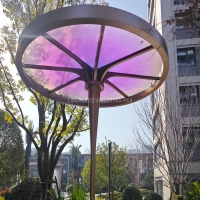Welcome to the website for landscape facilities products and knowledge.
What are the best practices for ensuring a landscape bar counter is resistant to damage from acidic fruits?
Landscape bar counters serve as beautiful focal points in modern living spaces, but their exposure to acidic fruits like lemons, oranges, and other citrus varieties presents significant challenges. The acidic properties in these fruits can etch, stain, or permanently damage many surface materials if proper precautions aren't implemented. Implementing best practices for acid resistance begins with material selection and continues through proper maintenance routines.
The foundation of acid resistance lies in selecting appropriate materials. Quartz surfaces, particularly those with high resin content, offer exceptional resistance to acidic substances due to their non-porous nature. Natural stones like granite with proper sealing provide good protection, though some varieties may require more frequent maintenance. Engineered materials specifically designed for food preparation areas often incorporate acid-resistant properties in their manufacturing process.
Sealing represents the most critical step for porous materials. Penetrating sealants designed specifically for acid resistance create an invisible barrier that prevents fruit acids from reaching the vulnerable substrate beneath. The sealing process must be performed meticulously, following manufacturer guidelines for application thickness, drying time, and curing conditions. Most sealants require reapplication every 1-3 years depending on usage frequency and cleaning methods.
Immediate cleanup protocols significantly reduce acid damage potential. Any fruit residue should be removed within 15-20 minutes of contact using pH-neutral cleaners specifically formulated for stone or engineered surfaces. Avoid vinegar-based or acidic cleaners that can compromise protective sealants over time. Soft microfiber cloths prevent microscopic scratches that can become entry points for acidic liquids.
Protective measures include using cutting boards for fruit preparation, placing citrus fruits in designated bowls with raised bottoms, and implementing coaster systems specifically designed for wet or acidic items. Regular maintenance should include inspections for sealant integrity using water bead tests – where water droplets should maintain their shape rather than absorbing into the surface.
For existing damage, specialized polishing compounds can sometimes restore etched surfaces, though severe damage may require professional refinishing. The investment in quality materials and consistent maintenance ultimately preserves both the aesthetic appeal and functional integrity of landscape bar counters, ensuring they remain beautiful centerpieces despite regular exposure to acidic fruits.
Related search:

Recommendation
Metal frame with gradient color acrylic combined with high-end shading landscape facilities